#Writing advice writing resources
Explore tagged Tumblr posts
Text
Fantasy Guide to Building A Culture

Culture is defined by a collection of morals, ethics, traditions, customs and behaviours shared by a group of people.
Hierarchy and Social Structures

Within every culture, there is a hierarchy. Hierarchies are an important part of any culture, usually do ingrained that one within the culture wouldn't even question it. Hierarchy can be established either by age, gender or wealth and could even determine roles within their society. Sometimes hierarchy can may be oppressive and rigid whilst other times, ranks can intermingle without trouble. You should consider how these different ranks interact with one another and whether there are any special gestures or acts of deference one must pay to those higher than them. For example, the Khasi people of Meghalaya (Northern India), are strictly matrillineal. Women run the households, inheritance runs through the female line, and the men of the culture typically defer to their mothers and wives. Here are a few questions to consider:
How is a leader determined within the culture as a whole and the family unit?
Is the culture matriarchal? Patriarchal? Or does gender even matter?
How would one recognise the different ranks?
How would one act around somebody higher ranking? How would somebody he expected to act around somebody lower ranking?
Can one move socially? If not, why? If so, how?
Traditions and Customs

Traditions are a staple in any culture. These can be gestures or living life a certain way or to the way a certain person should look. Traditions are a personal detail to culture, they are what make it important. Tradition can dictate how one should keep their home, run their family, take care of their appearance, act in public and even determine relationship. Tradition can also be a double edged sword. Traditions can also be restrictive and allow a culture to push away a former member if they do not adhere to them, eg Traditional expectations of chastity led to thousands of Irish women being imprisoned at the Magdelene Laundries. Customs could be anything from how one treats another, to how they greet someone.
How important is tradition?
What are some rituals your culture undertakes?
What are some traditional values in your world? Does it effect daily life?
Are there any traditions that determine one's status?
Values and Opinions

Values and Opinions are the bread and butter of any culture. This is the way your culture sees the world and how they approach different life hurdles. These may differ with other cultures and be considered odd to outsiders, what one culture may value another may not and what opinion another holds, one may not. There will be historical and traditional reasons to why these values and opinions are held. Cultures usually have a paragon to which they hold their members to, a list of characteristics that they expect one to if not adhere to then aspire to. The Yoruba people value honesty, hard work, courage and integrity. Here are some questions to consider?
How important are these ethics and core values? Could somebody be ostracised for not living up to them?
What are some morals that clash with other cultures?
What does your culture precieved to be right? Or wrong?
What are some opinions that are considered to be taboo in your culture? Why?
Dress Code

For many cultures, the way somebody dresses can be important. History and ethics can effect how one is meant to be dressed such as an expectation of chastity, can impose strict modesty. While other cultures, put more importance on details, the different sorts of clothes worn and when or what colour one might wear. The Palestinian people (من النهر إلى البحر ، قد يكونون أحرارا) denoted different family ties, marriage status and wealth by the embroidery and detailing on their thoub.
Are there traditional clothes for your world? Are they something somebody wears on a daily basis or just on occasion?
Are there any rules around what people can wear?
What would be considered formal dress? Casual dress?
What would happen if somebody wore the wrong clothes to an event?
Language

Language can also be ingrained as part of a Culture. It can be a specific way one speaks or a an entirely different language. For example, in the Southern States of America, one can engage in a sort of double talk, saying something that sounds sweet whilst delivering something pointed. Bless their heart. I have a post on creating your own language here.
Arts, Music and Craft

Many cultures are known for different styles of dance, their artwork and crafts. Art is a great part of culture, a way for people to express themselves and their culture in art form. Dance can be an integral part of culture, such as céilí dance in Ireland or the Polka in the Czech Republic. Handicrafts could also be important in culture, such as knitting in Scottish culture and Hebron glass in Palestine. Music is also close to culture, from traditional kinds of singing such as the White Voice in Ukraine and the playing of certain instruments such as the mvet.
Food and Diet

The way a culture prepares or intakes or treats certain foods are important to a culture. In some cultures, there is a diet yo adhere to, certain foods are completely banned. With Jewish culture, pork is prohibited along with fish such as sturgeon, along with shellfish and certain fowl. Meat must also be prepared in a certain way and animal byproducts such as dairy, must never be created or even eaten around this meat. This is known as kosher. The way one consumes food is also important to culture. In some cultures, only certain people may eat together. Some cultures place important on how food is eaten. In Nigerian culture, the oldest guests are served first usually the men before the women. In Japanese culture, one must say 'itadakimasu' (I recieve) before eating. Culture may also include fasting, periods of time one doesn't intake food for a specific reason.
What are some traditional dishes in your world?
What would be a basic diet for the common man?
What's considered a delicacy?
Is there a societal difference in diet? What are the factors that effect diet between classes?
Is there any influence from other cuisines? If not, why not? If so, to what extent?
What would a typical breakfast contain?
What meals are served during the day?
What's considered a comfort food or drink?
Are there any restrictions on who can eat what or when?
Are there any banned foods?
What stance does your world take on alcohol? Is it legal? Can anybody consume it?
Are there any dining customs? Are traditions?
Is there a difference in formal meals or casual meals? If so, what's involved?
Are there any gestures or actions unacceptable at the dinner table?
How are guests treated at meals? If they are given deference, how so?
#Fantasy Guide to Building A Culture#As promised#If I fail my German exam I'm blaming ye#Culture#Building a culture#Fantasy Guide#WorldBuilding#WorldBuilding guide#WorldBuilding help#Writing help#writing#writeblr#writing resources#writing reference#writing advice#ask answered questions#writers#writing advice writing resources#spilled ink#ask answered
10K notes
·
View notes
Text
Writing Description Notes:
Updated 9th September 2024 More writing tips, review tips & writing description notes
Facial Expressions
Masking Emotions
Smiles/Smirks/Grins
Eye Contact/Eye Movements
Blushing
Voice/Tone
Body Language/Idle Movement
Thoughts/Thinking/Focusing/Distracted
Silence
Memories
Happy/Content/Comforted
Love/Romance
Sadness/Crying/Hurt
Confidence/Determination/Hopeful
Surprised/Shocked
Guilt/Regret
Disgusted/Jealous
Uncertain/Doubtful/Worried
Anger/Rage
Laughter
Confused
Speechless/Tongue Tied
Fear/Terrified
Mental Pain
Physical Pain
Tired/Drowsy/Exhausted
Eating
Drinking
Warm/Hot
#creative writers#creative writing#fanfic review#fanfiction#fanfiction tips#helping writers#how to write#references for writers#wingfic#writer#writers#writers and poets#writers community#writers corner#writers of tumblr#writers on tumblr#writing#writing advice#writing community#writing help#writing inspiration#writing life#writing prompts#writing resources#writing tips#writing tips and tricks#writing description#descriptive writing
30K notes
·
View notes
Text
Other Words for "Look" + With meanings | List for writers
Many people create lists of synonyms for the word 'said,' but what about the word 'look'? Here are some synonyms that I enjoy using in my writing, along with their meanings for your reference. While all these words relate to 'look,' they each carry distinct meanings and nuances, so I thought it would be helpful to provide meanings for each one.
Gaze - To look steadily and intently, especially in admiration or thought.
Glance - A brief or hurried look.
Peek - A quick and typically secretive look.
Peer - To look with difficulty or concentration.
Scan - To look over quickly but thoroughly.
Observe - To watch carefully and attentively.
Inspect - To look at closely in order to assess condition or quality.
Stare - To look fixedly or vacantly at someone or something.
Glimpse - To see or perceive briefly or partially.
Eye - To look or stare at intently.
Peruse - To read or examine something with great care.
Scrutinize - To examine or inspect closely and thoroughly.
Behold - To see or observe a thing or person, especially a remarkable one.
Witness - To see something happen, typically a significant event.
Spot - To see, notice, or recognize someone or something.
Contemplate - To look thoughtfully for a long time at.
Sight - To suddenly or unexpectedly see something or someone.
Ogle - To stare at in a lecherous manner.
Leer - To look or gaze in an unpleasant, malicious way.
Gawk - To stare openly and stupidly.
Gape - To stare with one's mouth open wide, in amazement.
Squint - To look with eyes partially closed.
Regard - To consider or think of in a specified way.
Admire - To regard with pleasure, wonder, and approval.
Skim - To look through quickly to gain superficial knowledge.
Reconnoiter - To make a military observation of a region.
Flick - To look or move the eyes quickly.
Rake - To look through something rapidly and unsystematically.
Glare - To look angrily or fiercely.
Peep - To look quickly and secretly through an opening.
Focus - To concentrate one's visual effort on.
Discover - To find or realize something not clear before.
Spot-check - To examine something briefly or at random.
Devour - To look over with eager enthusiasm.
Examine - To inspect in detail to determine condition.
Feast one's eyes - To look at something with great enjoyment.
Catch sight of - To suddenly or unexpectedly see.
Clap eyes on - To suddenly see someone or something.
Set eyes on - To look at, especially for the first time.
Take a dekko - Colloquial for taking a look.
Leer at - To look or gaze in a suggestive manner.
Rubberneck - To stare at something in a foolish way.
Make out - To manage to see or read with difficulty.
Lay eyes on - To see or look at.
Pore over - To look at or read something intently.
Ogle at - To look at in a lecherous or predatory way.
Pry - To look or inquire into something in a determined manner.
Dart - To look quickly or furtively.
Drink in - To look at with great enjoyment or fascination.
Bask in - To look at or enjoy something for a period of time.
#on writing#creative writing#writing#writing tips#writers block#how to write#thewriteadviceforwriters#writeblr#writers and poets#writers on tumblr#novel writing#fiction writing#romance writing#writing advice#writing blog#writing characters#writing community#writing help#writing ideas#writing inspiration#writing guide#writing prompts#writing a book#writing resources#writing reference#writing tips and tricks#writers#writing tools#writing life#writing software
12K notes
·
View notes
Text
When your Character...
Gets into: A Fight ⚜ ...Another Fight ⚜ ...Yet Another Fight
Hates Someone ⚜ Kisses Someone ⚜ Falls in Love
Calls Someone they Love ⚜ Dies / Cheats Death ⚜ Drowns
is...
A Ballerina ⚜ A Child ⚜ Interacting with a Child ⚜ A Cheerleader
A Cowboy ⚜ A Genius ⚜ A Lawyer ⚜ A Pirate ⚜ A Spy
A Wheelchair User ⚜ A Zombie ⚜ Beautiful ⚜ Dangerous ⚜ Drunk
Funny ⚜ In a Coma ⚜ In a Secret Society ⚜ Injured ⚜ Shy
needs...
A Magical Item ⚜ An Aphrodisiac ⚜ A Fictional Poison
A Coping Strategy ⚜ A Drink ⚜ A Medicinal Herb ⚜ A Mentor
Money ⚜ A Persuasion Tactic ⚜ A Quirk ⚜ To be Killed Off
To Become Likable ⚜ To Clean a Wound ⚜ To Self-Reflect
To Find the Right Word, but Can't ⚜ To Say No ⚜ To Swear
loves...
Astronomy ⚜ Baking ⚜ Cooking ⚜ Cocktails ⚜ Food ⚜ Oils
Dancing ⚜ Fashion ⚜ Gems ⚜ Herbal Remedies ⚜ Honey
Mushrooms ⚜ Mythology ⚜ Numbers ⚜ Perfumes
Roses ⚜ Sweets ⚜ To Argue ⚜ To Insult ⚜ To Kiss
To Make False Claims ⚜ Wine ⚜ Wine-Tasting ⚜ Yoga
has/experiences...
Allergies ⚜ Amnesia ⚜ Bereavement ⚜ Bites & Stings
Bruises ⚜ Caffeine ⚜ CO Poisoning ⚜ Color Blindness
Facial Hair ⚜ Fainting ⚜ Fevers ⚜ Food Allergies
Food Poisoning ⚜ Fractures ⚜ Frostbite ⚜ Hypothermia
Injuries ⚜ Jet Lag ⚜ Kidnapping ⚜ Manipulation ⚜ Mutism
Pain ⚜ Paranoia ⚜ Poisoning ⚜ More Pain & Violence
Scars ⚜ Trauma ⚜ Viruses ⚜ Wounds
[these are just quick references. more research may be needed to write your story...]
Writing Resources PDFs
#requested#writing reference#character development#writeblr#dark academia#spilled ink#writing prompts#writing inspiration#writing ideas#creative writing#compilation#fiction#light academia#literature#writers on tumblr#writing prompt#poets on tumblr#writing tips#writing advice#writing resources#updated: december 2024
18K notes
·
View notes
Text
Writing Tips Master Post
Edit: Some posts may be deleted
Character writing/development:
Character Arcs
Making Character Profiles
Character Development
Comic Relief Arc
Internal Conflict
Character Voices
Creating Distinct Characters
Creating Likeable Characters
Writing Strong Female Characters
Writing POC Characters
Building Tension
Writing Grumpy x Sunshine Tropes
Plot devices/development:
Intrigue in Storytelling
Enemies to Lovers
Alternatives to Killing Characters
Worldbuilding
Misdirection
Consider Before Killing Characters
Foreshadowing
Narrative:
Emphasising the Stakes
Avoid Info-Dumping
Writing Without Dialogue
1st vs. 2nd vs. 3rd Perspective
Fight Scenes (+ More)
Transitions
Pacing
Writing Prologues
Dialogue Tips
Writing War
Writing Cheating
Worldbuilding:
Worldbuilding: Questions to Consider
Creating Laws/Rules in Fantasy Worlds
Book writing:
Connected vs. Stand-Alone Series
A & B Stories
Writer resources:
Writing YouTube Channels, Podcasts, & Blogs
Online Writing Resources
Outlining/Writing/Editing Software
Writer help:
Losing Passion/Burnout
Overcoming Writer's Block
Fantasy terms:
How To Name Fantasy Races (Step-by-Step)
Naming Elemental Races
Naming Fire-Related Races
How To Name Fantasy Places
Ask games:
Character Ask Game #1
Character Ask Game #2
Character Ask Game #3
Miscellaneous:
1000 Follower Post
2000 Follower Poll
Writing Fantasy
#masterlist#masterpost#writeblr#writing#writing tips#writing advice#writing help#writing resources#author resources#writer resources#creative writing#character writing#character development#plot development#narrative#book writing#writers block#writer stuff#writer things#fantasy writing#writer ask game#deception-united
24K notes
·
View notes
Text
20 Compelling Positive-Negative Trait Pairs
Here are 20 positive and negative trait pairs that can create compelling character dynamics in storytelling:
1. Bravery - Recklessness: A character is courageous in the face of danger but often takes unnecessary risks.
2. Intelligence - Arrogance: A character is exceptionally smart but looks down on others.
3. Compassion - Naivety: A character is deeply caring but easily deceived due to their trusting nature.
4. Determination - Stubbornness: A character is persistent in their goals but unwilling to adapt or compromise.
5. Charisma - Manipulativeness: A character is charming and persuasive but often uses these traits to exploit others.
6. Resourcefulness - Opportunism: A character is adept at finding solutions but is also quick to exploit situations for personal gain.
7. Loyalty - Blind Obedience: A character is fiercely loyal but follows orders without question, even when they're wrong.
8. Optimism - Denial: A character remains hopeful in difficult times but often ignores harsh realities.
9. Humor - Inappropriateness: A character lightens the mood with jokes but often crosses the line with their humor.
10. Generosity - Lack of Boundaries: A character is giving and selfless but often neglects their own needs and well-being.
11. Patience - Passivity: A character is calm and tolerant but sometimes fails to take action when needed.
12. Wisdom - Cynicism: A character has deep understanding and insight but is often pessimistic about the world.
13. Confidence - Overconfidence: A character believes in their abilities but sometimes underestimates challenges.
14. Honesty - Bluntness: A character is truthful and straightforward but often insensitive in their delivery.
15. Self-discipline - Rigidity: A character maintains strong control over their actions but is inflexible and resistant to change.
16. Adventurousness - Impulsiveness: A character loves exploring and trying new things but often acts without thinking.
17. Empathy - Overwhelm: A character deeply understands and feels others' emotions but can become overwhelmed by them.
18. Ambition - Ruthlessness: A character is driven to achieve great things but willing to do anything, even unethical, to succeed.
19. Resilience - Emotional Detachment: A character can endure hardships without breaking but often seems emotionally distant.
20. Strategic - Calculative: A character excels at planning and foresight but can be cold and overly pragmatic in their decisions.
These pairs create complex, multi-dimensional characters that can drive rich, dynamic storytelling.
---
+ If you find my content valuable, consider Support This Blog on Patreon!
#writing tips#writing advice#character development#writers on tumblr#writeblr#creative writing#fiction writing#writerscommunity#writing#writing help#writing resources#ai assisted
15K notes
·
View notes
Text
Writing References: Character Development
50 Questions ⚜ Backstory ⚜ Character-driven Story
Basics: How to Write a Character ⚜ A Story-Worthy Hero
Basics: Character-Building ⚜ Character Creation
Types of Characters: Key Characters ⚜ Literary Characters ⚜ Flat & Round Characters ⚜ Morally Grey ⚜ Narrators ⚜ Allegorical Characters ⚜ Archetypes ⚜ Stereotypical Characters
Worksheets: Backstory ⚜ Character ⚜ Kill your Characters ⚜ Antagonist; Villain; Fighting ⚜ Change; Adding Action; Conflict ⚜ Character Sketch & Bible ⚜ Protagonist & Antagonist ⚜ Name; Quirks; Flaws; Motivation ⚜ "Interviewing" your Characters ⚜ "Well-Rounded" Character
Personality Traits
5 Personality Traits (OCEAN) ⚜ 16 Personality Traits (16PF)
600+ Personality Traits ⚜ 170 Quirks
East vs. West Personalities ⚜ Trait Theories
Tips/Editing
Character Issues ⚜ Character Tropes for Inspiration
"Strong" Characters ⚜ Unlikable to Likable
Tips from Rick Riordan
Writing Notes
Binge ED ⚜ Hate ⚜ Love ⚜ Identifying Character Descriptions
Childhood Bilingualism ⚜ Children's Dialogue ⚜ On Children
Culture ⚜ Culture: Two Views ⚜ Culture Shock
Dangerousness ⚜ Flaws ⚜ Fantasy Creatures
Emotional Intelligence ⚜ Genius (Giftedness)
Emotions (1) (2) ⚜ Anger ⚜ Fear ⚜ Happiness ⚜ Sadness
Emotional Universals ⚜ External & Internal Journey
Goals & Motivations ⚜ Grammar Development ⚜ Habits
Facial Expressions ⚜ Jargon ⚜ Swearing & Taboo Expressions
Happy/Excited Body Language ⚜ Laughter & Humor
Health ⚜ Frameworks of Health ⚜ Memory
Mutism ⚜ Shyness ⚜ Parenting Styles ⚜ Generations
Psychological Reactions to Unfair Behavior
Rhetoric ⚜ The Rhetorical Triangle ⚜ Logical Fallacies
Thinking ⚜ Thinking Styles ⚜ Thought Distortions
Uncommon Words: Body ⚜ Emotions
Villains ⚜ Voice & Accent
More References: Plot ⚜ World-building ⚜ Writing Resources PDFs
#writing reference#character building#writing tips#writing advice#character inspiration#writeblr#dark academia#spilled ink#literature#writing prompt#creative writing#fiction#writers on tumblr#story#novel#light academia#writing resources#compilation requested by anon#still a bit messy & incomplete - will edit soon#will also update this every few weeks/months
10K notes
·
View notes
Text
“Oh,” They giggled, cheeks pink.
“Oh!” They gasped, hands to their mouth in horror.
“Oh,” they whined, gripping their hair in frustration.
“Oh,” they breathed, head back and lashes fluttering.
“Oh,” they mumbled, shifting awkwardly.
“Oh,” they deadpanned, arms crossed.
“Oh?” they asked, brow arched and smile bitter.
“Oh,” they chided with a smirk.
“Oh?” they asked, head tilted curiously.
“Oh!” they hissed, scrambling away.
“Oh,” they mumbled, rubbing their neck.
“Oh,” they uttered, eyes wide in awe.
“Oh,” they muttered with an ill-impressed frown.
“Oh!” They cried, throwing their arms around them.
“Oh,” they goaded, smiling mischievously.
“Oh,” they taunted, skipping backwards.
“Oh,” they snarked, hands on their hips.
“Oh,” they breathed, putting it all together.
“Oh,” they said softly, hugging themselves.
“Oh,” they whispered, holding back tears.
“Oh!” they gasped, ducking out of the way.
“Oh,” they uttered, and smacked their forehead.
“Oh,” they laughed, brows wiggling.
“Oh,” they tittered, batting their lashes.
“Oh,” they hissed, gritting their teeth.
"Oh."
Tag your dialogue.
#writing dialogue#dialogue tags#writing#writing advice#writing resources#writing a book#writing tips#writing tools#writeblr
10K notes
·
View notes
Text
A general cane guide for writers and artists (from a cane user, writer, and artist!)
Disclaimer: Though I have been using a cane for 6 years, I am not a doctor, nor am I by any means an expert. This guide is true to my experience, but there are as many ways to use a cane as there are cane users!
This guide will not include: White canes for blindness, crutches, walkers, or wheelchairs as I have no personal experience with these.
This is meant to be a general guide to get you started and avoid some common mishaps/misconceptions in your writing, but you absolutely should continue to do your own research outside of this guide!
This is NOT a medical resource!!! And never tell a real person you think they're using a cane wrong!
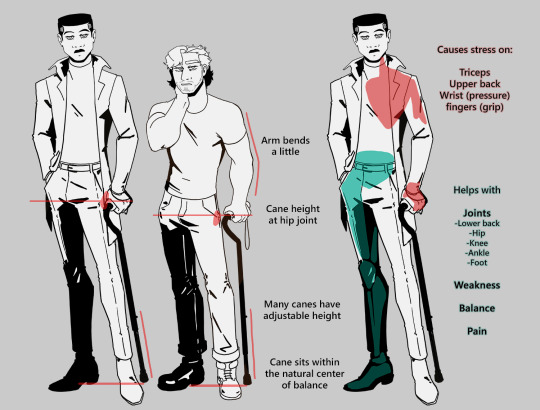
The biggest recurring problem I've seen is using the cane on the wrong side. The cane goes on the opposite side of the pain! If your character has even-sided pain or needs it for balance/weakness, then use the cane in the non-dominant hand to keep the dominant hand free. Some cane users also switch sides to give their arm a rest!
A cane takes about 20% of your weight off the opposite leg. It should fit within your natural gait and become something of an extension of your body. If you need more weight off than 20%, then crutches, a walker, or a wheelchair is needed.
Putting more pressure on the cane, using it on the wrong side, or having it at the wrong height can make it less effective, and can cause long term damage to your body from improper pressure and posture. (Hugh Laurie genuinely hurt his body from years of using a cane wrong on House!)
(some people elect to use a cane wrong for their personal situation despite this, everyone is different!)
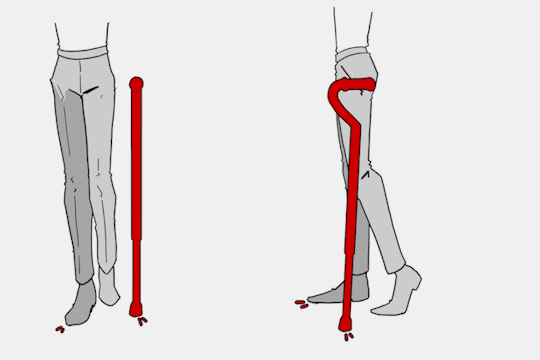
(an animated GIF of a cane matching the natural walking gait. It turns red when pressure is placed on it.)
When going up and down stairs, there is an ideal standard: You want to use the handrail and the cane at the same time, or prioritize the handrail if it's only on one side. When going up stairs you lead with your good leg and follow with the cane and hurt leg together. When going down stairs you lead with the cane and the bad leg and follow with the good leg!
Realistically though, many people don't move out of the way for cane users to access the railing, many stairs don't have railings, and many are wet, rusty, or generally not ideal to grip.
In these cases, if you have a friend nearby, holding on to them is a good idea. Or, take it one step at a time carefully if you're alone.
Now we come to a very common mistake I see... Using fashion canes for medical use!
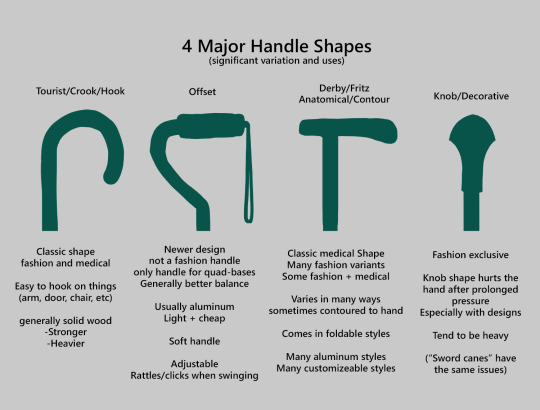
(These are 4 broad shapes, but there is INCREDIBLE variation in cane handles. Research heavily what will be best for your character's specific needs!)
The handle is the contact point for all the weight you're putting on your cane, and that pressure is being put onto your hand, wrist, and shoulder. So the shape is very important for long term use!
Knob handles (and very decorative handles) are not used for medical use for this reason. It adds extra stress to the body and can damage your hand to put constant pressure onto these painful shapes.
The weight of a cane is also incredibly important, as a heavier cane will cause wear on your body much faster. When you're using it all day, it gets heavy fast! If your character struggles with weakness, then they won't want a heavy cane if they can help it!
This is also part of why sword canes aren't usually very viable for medical use (along with them usually being knob handles) is that swords are extra weight!
However, a small knife or perhaps a retractable blade hidden within the base might be viable even for weak characters.
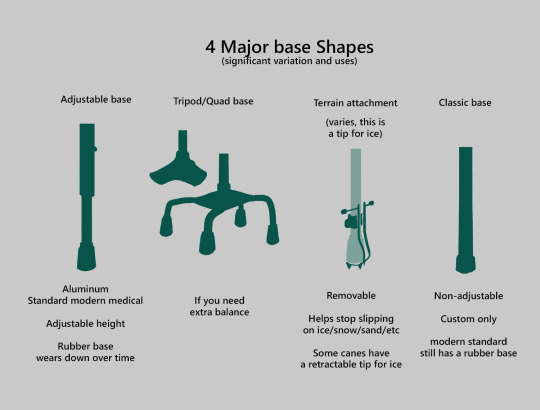
Bases have a lot of variability as well, and the modern standard is generally adjustable bases. Adjustable canes are very handy if your character regularly changes shoe height, for instance (gotta keep the height at your hip!)
Canes help on most terrain with their standard base and structure. But for some terrain, you might want a different base, or to forego the cane entirely! This article covers it pretty well.
Many cane users decorate their canes! Stickers are incredibly common, and painting canes is relatively common as well! You'll also see people replacing the standard wrist strap with a personalized one, or even adding a small charm to the ring the strap connects to. (nothing too large, or it gets annoying as the cane is swinging around everywhere)
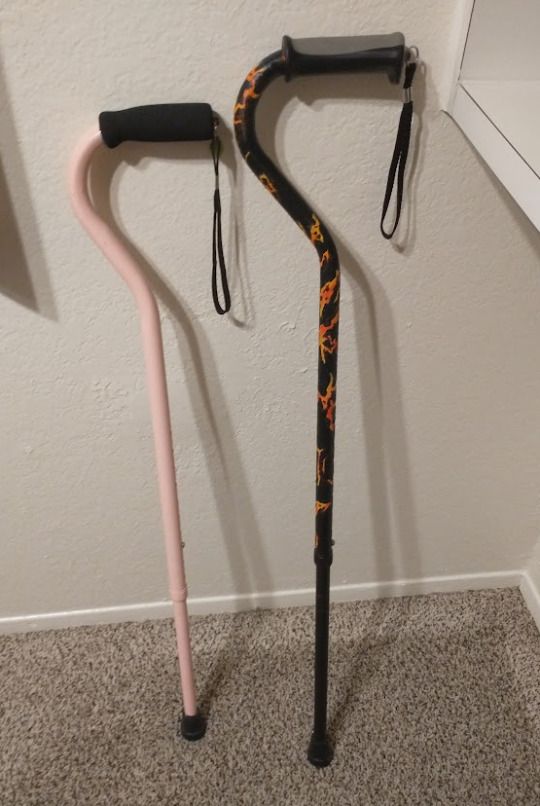
(my canes, for reference)
If your character uses a cane full time, then they might also have multiple canes that look different aesthetically to match their outfits!
When it comes to practical things outside of the cane, you reasonably only have one hand available while it's being used. Many people will hook their cane onto their arm or let it dangle on the strap (if they have one) while using their cane arm, but it's often significantly less convenient than 2 hands. But, if you need 2 hands, then it's either setting the cane down or letting it hang!
For this reason, optimizing one handed use is ideal! Keeping bags/items on the side of your free hand helps keep your items accessible.
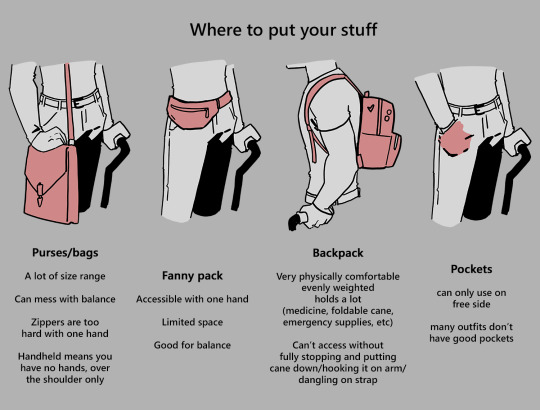
When sitting, the cane either leans against a wall or table, goes under the chair, or hooks onto the back of the chair. (It often falls when hanging off of a chair, in my experience)
When getting up, the user will either use their cane to help them balance/support as they stand, or get up and then grab their cane. This depends on what it's being used for (balance vs pain when walking, for instance!)
That's everything I can think of for now. Thank you for reading my long-but-absolutely-not-comprehensive list of things to keep in mind when writing or drawing a cane user!
Happy disability pride month! Go forth and make more characters use canes!!!
#mobility aid#cane user#writing tips#writing advice#drawing tips#art tutorial#art tips#art reference#art resources#art help#my art#long post
91K notes
·
View notes
Text
NEED HELP WRITING? (a masterlist)
I have likely not added many that I've reblogged to this list. Please feel free to roam my blog and/or ask/message me to add something you'd like to see on this list!
Synonym Lists
Look by @writers-potion
Descriptors
Voices by @saraswritingtipps
Show, Don't Tell by @lyralit
Tips & Tricks
5 Tips for Creating Intimidating Antagonists by @writingwithfolklore
How To (Realistically) Make a Habit of Writing by @byoldervine
Let's Talk About Misdirection by @deception-united
Tips to Improve Character Voice by @tanaor
Stephen King's Top 20 Rules for Writers posted by @toocoolformedschool
Fun Things to Add to a Fight Scene (Hand to Hand Edition) by @illarian-rambling
Questions I Ask My Beta Readers by @burntoutdaydreamer
Skip Google for Research by @s-n-arly
Breaking Writing Rules Right: Don't Write Direct Dialogue by @septemberercfawkes
Databases/Resources
International Clothing
Advice/Uplifting
Too Ashamed of Writing To Write by @writingquestionsanswered
"Said" is Beautiful by @blue-eyed-author
16K notes
·
View notes
Text
Writing tips for long fics that helped me that no one asked for.
1.) Don't actually delete content from your WIP unless it is minor editing - instead cut it and put it in a secondary document. If you're omitting paragraphs of content, dialog, a whole scene you might find a better place for it later and having it readily available can really save time. Sometimes your idea was fantastic, but it just wasn't in the right spot.
2.) Stuck with wording the action? Just write the dialog then revisit it later.
3.) Stuck on the whole scene? Skip it and write the next one.
4.) Write on literally any other color than a white background. It just works. (I use black)
5.) If you have a beta, while they are beta-ing have them read your fic out loud. Yes, I know a lot of betas/writers do not have the luxury of face-timing or have the opportunity to do this due to time constraints etc but reading your fic out loud can catch some very awkward phrasing that otherwise might be missed. If you don't have a beta, you read it out loud to yourself. Throw some passion into your dialog, you might find a better way to word it if it sounds stuffy or weird.
6.) The moment you have an idea, write it down. If you don't have paper or a pen, EMAIL it to yourself or put it in a draft etc etc. I have sent myself dozens of ideas while laying down before sleep that I 10/10 forgot the next morning but had emailed them to myself and got to implement them.
7.) Remember - hits/likes/kudos/comments are not reflective of the quality of your fic or your ability to write. Most people just don't comment - even if they say they do, they don't, even if they preach all day about commenting, they don't, even if they are a very popular blog that passionately reminds people to comment - they don't comment (I know this personally). Even if your fic brought tears to their eyes and it haunted them for weeks and they printed it out and sent it to their friends they just don't comment. You just have to accept it. That being said - comment on the fic you're reading now, just do it, if you're 'shy' and that's why you don't comment the more you comment the better you'll get at it. Just do it.
8.) Remove unrealistic daily word count goals from your routine. I've seen people stress 1500 - 2000 words a day and if they don't reach that they feel like a failure and they get discouraged. This is ridiculous. Write when you can, but remove absurd goals. My average is 500 words a day in combination with a 40 hour a week job and I have written over 200k words from 2022-2023.
9.) There are dozens of ways to do an outline from precise analytical deconstruction that goes scene by scene to the minimalist bullet point list - it doesn't matter which one you use just have some sort of direction. A partial outline is better than no outline.
10.) Write for yourself, not for others. Write the fic you know no one is going to read. Write the fic that sounds ridiculous. You will be so happy you put it out in the world and there will be people who will be glad it exists.
32K notes
·
View notes
Text
Fantasy Guide to Wards and Fostering

I get a lot of asks about wards and recently it's been a FAQ. So here's a quick guide to warding.
What is Warding?
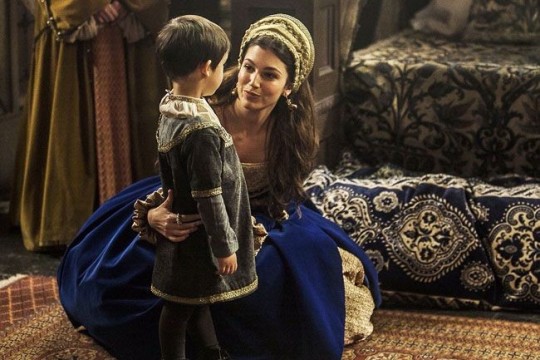
Warding was a tradition in which a noble it royal family would take in a child from another family to their home for the purpose of educating them and preparing them for adulthood or to protect their interests. Warding was seen as a big compliment to the family of the foster child, especially if the family that fosters their child is much higher ranking. However, warding could also be in response to the family's misbehavior and insubordination or in some cases their death. Warding isn't adoption. Warding does not entitle the child to inherit anything. They cannot inherit a place in the succession, they cannot inherit lands or money or titles.
The Ward
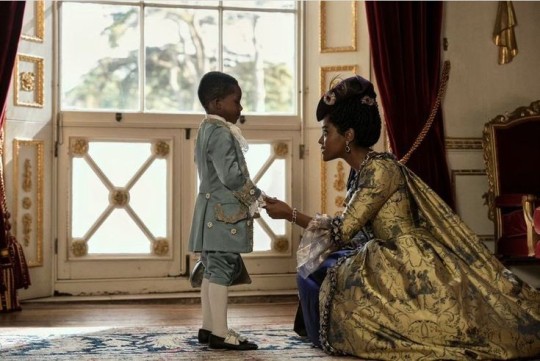
The ward was usually a child of a lower ranking family, between the ages of seven to maturity at 16 or so. Wards usually had parents in which case the foster family was charged with the child's physical and educational welfare. The ward could return to their parents at any time either at their insistence or with the blessing of their foster family. Wards were raised alongside the host family's children as well as other wards. They were fed, clothed and educated by their foster family as essentially treated as part of the family. However, wards that come from unfriendly or rebellious families were essentially used as chips for good behaviour. If their parents or kin act up, they could be killed. Wards could also be orphaned. In this case, their foster father would have control their lands and money which is why an overlord would seek to claim warship over a vassal heir to ensure peace. Wards could also be adopted by family.
The Foster Family
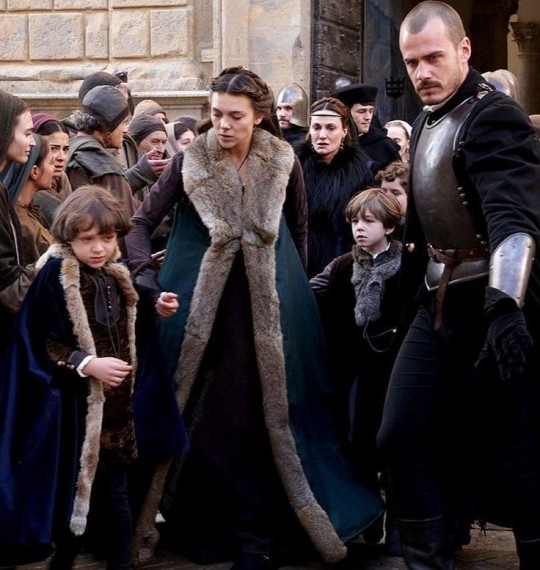
The family were nearly always higher ranking and usually had another motive other than charity for taking in the ward. Sometimes the child could be used as collateral against an untrustworthy family or sometimes they were prospective spouses for the family's heirs. It was the responsibility of the foster family to discipline, educate and protect the ward. They would be charged with teaching the ward all the trappings of their position from warfare to statecraft to etiquette.
Wards to Royal families
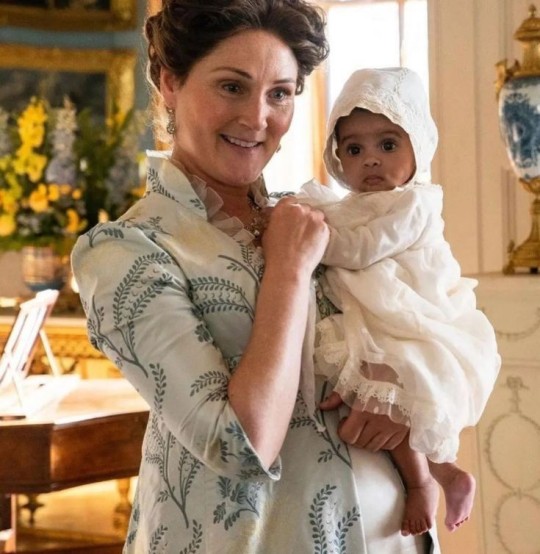
In some cases, a ward might strike gold and be warded at court by the monarch. Wards would live at court but would be unlikely to be taught the skills by the monarch or Consort personally but would be provided with the best tutors. Wards could be brought in to be companions to the Royal children or in order to ensure their inheritances were not subjected to disputes if they were orphans or again, if their family were likely to commit trouble. Royal wards were always nobility but in some rare and extreme cases they could also be royal themselves, usually of displaced and exiled families or as prospective matches to royal children.
Wardship & Women

In some cases, an unmarried woman or a widow could be placed in the protection of an overlord or male relative in order to protective her interests. If a woman was the heir to a grand title or vast fortune and had no father or brother, the monarch or overlord would insist that a male relative or her overlord would take her in lest her claim put her in danger. Usually, it would be up to their host to arrange a match or aid her in brokering one herself.
#Fantasy Guide to Wards and fostering#Wards#I thought I'd make this for y'all#writing resources#writing research#writing advice writing reference#writing reference writing resources#writing resources writing advice#writing#writeblr#writing reference#writing advice#writing advice writing resources#writers#Writing help
3K notes
·
View notes
Text
The symbolism of flowers
Flowers have a long history of symbolism that you can incorporate into your writing to give subtext.
Symbolism varies between cultures and customs, and these particular examples come from Victorian Era Britain. You'll find examples of this symbolism in many well-known novels of the era!
Amaryllis: Pride
Black-eyed Susan: Justice
Bluebell: Humility
Calla Lily: Beauty
Pink Camellia: Longing
Carnations: Female love
Yellow Carnation: Rejection
Clematis: Mental beauty
Columbine: Foolishness
Cyclamen: Resignation
Daffodil: Unrivalled love
Daisy: Innocence, loyalty
Forget-me-not: True love
Gardenia: Secret love
Geranium: Folly, stupidity
Gladiolus: Integrity, strength
Hibiscus: Delicate beauty
Honeysuckle: Bonds of love
Blue Hyacinth: Constancy
Hydrangea: Frigid, heartless
Iris: Faith, trust, wisdom
White Jasmine: Amiability
Lavender: Distrust
Lilac: Joy of youth
White Lily: Purity
Orange Lily: Hatred
Tiger Lily: Wealth, pride
Lily-of-the-valley: Sweetness, humility
Lotus: Enlightenment, rebirth
Magnolia: Nobility
Marigold: Grief, jealousy
Morning Glory: Affection
Nasturtium: Patriotism, conquest
Pansy: Thoughtfulness
Peony: Bashfulness, shame
Poppy: Consolation
Red Rose: Love
Yellow Rose: Jealously, infidelity
Snapdragon: Deception, grace
Sunflower: Adoration
Sweet Willian: Gallantry
Red Tulip: Passion
Violet: Watchfulness, modesty
Yarrow: Everlasting love
Zinnia: Absent, affection
#writers#creative writing#writing community#writing#writers of tumblr#writing inspiration#creative writers#writeblr#writerblr#writing tips#flower symbolism#writing subtext#writblr#writers corner#how to write subtext#symbolism in writing#writing advice#creative writing tips#writing resources#writing help#writer tips#writing tips and tricks#helping writers#help for writers#references for writers#writing reference#writers block#beat writers block#novel writing
59K notes
·
View notes
Text
Developing Backstory: Bringing Characters to Life

1. Where It All Started: The Character’s Origin
Place of Birth: Where did your character first see the world? Think about the impact of this place—was it a busy city where they had to fight for attention or a quiet village where everyone knew everyone’s business? This location doesn’t just say where they’re from; it shapes how they see the world.
Family and Upbringing: What was their family like? Were their parents loving or distant? Maybe they were raised by someone other than their parents—a mentor, an older sibling, or even alone. Family (or the lack of it) is usually one of the most significant factors in shaping who someone becomes.
Society’s Expectations: What was expected of them when they were young? Possibly, they were born into wealth, with all the pressure to continue the family legacy, or maybe they were raised to be invisible in a world where survival mattered. How does this influence who they are now? Do they accept or reject those expectations?

2. Childhood Events That Left a Mark
First Taste of Conflict: Think about the first time the character realized the world wasn’t a perfect place. Maybe they witnessed violence or faced betrayal. What was that moment, and how did it stick with them? This moment usually lays the foundation for the character’s emotional landscape—fear, hope, ambition, or distrust all come from these early life lessons.
Childhood Dreams: When they were young, what did they want to be? Every child has dreams—did they want to be a knight, a scholar, or even just someone who could travel the world? Did they have to give up these dreams? How does that lost dream shape them now?
Formative Relationships: Who was their first best friend, mentor, or enemy? Childhood friendships and relationships often create deep bonds or wounds that last into adulthood. Did they have a mentor who taught them everything, only to betray them? Did they lose a childhood friend that still haunts them?

3. The Teen Years: Where They Start to Become Who They Are
Trials and Tribulations: What’s the biggest challenge they faced as they grew up? Was it losing a loved one, failing at something important, or maybe being forced into a role they didn’t want? These teenage years are where the emotional armor starts forming—how did the difficulties they faced shape them into the person they are now?
Education or Training: How did they learn what they know? Were they formally trained by an institution, learning everything by the book, or did they learn through experience, like a street-smart survivalist? What impact does their education or lack of it have on how they interact with others?
Teenage Bonds: Did they have a first love or a first major falling out with someone close to them? These experiences often create emotional scars or connections that they carry with them into adulthood. How does that past friendship or romance influence their behavior now?

4. Key Life Events: The Big Moments That Define Them
Trauma or Loss: Was there a moment that changed everything? Think about a significant loss—maybe a loved one, their home, or a sense of identity. How does this event affect their worldview? Do they build walls around themselves or dive into relationships with reckless abandon because they fear losing more?
Victory or Failure: Did they experience a moment of triumph or devastating defeat? Success and failure leave their marks. Were they celebrated as a hero once, leading them to overconfidence, or did they fail when everyone was counting on them, leading to crippling self-doubt?
Betrayal: Was there a betrayal that shaped their adult relationships? Whether it is a friend, family member, or lover, betrayal often changes how we trust others. Do they close themselves off, constantly expecting betrayal, or try to rebuild trust, afraid of being left alone again.

5. Where They Stand Now: The Present Moment
What Drives Them Today: What’s the one thing pushing them forward now? Is it revenge, the need to restore their family’s honor, or maybe even just survival? Whatever it is, this motivation should tie directly back to their experiences.
Emotional Baggage: What unresolved emotional wounds are they carrying? Everyone has scars from their past—some are visible, others not so much. How do these emotional wounds affect how they treat others, how they react to conflict, and how they move through the world.
Current Relationships: Who’s still in their life from their past, and how do they feel about it? Did they reconnect with someone they thought they’d lost, or are they haunted by unresolved issues with people from their past? Do they have any ongoing tensions or regrets tied to these people?

6. Tying Themes to Their Backstory
Cultural or Mythological Influence: How does their personal story tie into the larger world’s mythology or culture? Do they carry a family legacy, a curse, or a prophecy that hangs over them? How does this influence their interactions with others and their perception of themselves?
Recurring Symbols: Are there objects, dreams, or people that keep showing up in their life, symbolizing their journey? Perhaps a recurring nightmare haunts them, or they carry an object from their past that’s both a source of comfort and pain

7. Character Arc: The Journey from Past to Present
How Does Their Past Shape Their Growth?: Every character has emotional baggage that needs resolving. How does their backstory drive their arc? Do they need to forgive themselves, let go of the past, or accept who they’ve become to move forward?
Unanswered Questions from the Past: Are there any mysteries in their backstory they need to solve? Maybe they’re unaware of their true parentage, or maybe there’s a forgotten event from their childhood that will resurface and change everything.
#writerscommunity#character backstory guide#writer community#writerscorner#creative writers#writeblr#writerblr#writers on tumblr#writers#free resources#tips and tricks#writing advice#fantasy writing#fiction writing#tumblr writing community#writing a book#writing#writing guide#story writing#writing help#writing resources#writing stuff
5K notes
·
View notes
Text
Pirate Terms and Phrases
-> Pirate Lingo
-> A Pirate's Glossary
Batten Down The Hatches - tie everything down and put stuff away for a coming storm.
Brig - a prison on a ship.
Bring a Spring Upon 'er - turn the ship in a different direction
Broadside - the most vulnerable angle of a ship that runs the length of the boat.
Cutlass - a thick, heavy and rather short sword blade.
Dance with Jack Ketch - to hang; death at the hands of the law (Jack Ketch was a famed English executioner).
Davy Jones's Locker - a mythical place at the bottom of the ocean where drowned sailors are said to go.
Dead Men Tell No Tales - the reason given for leaving no survivors.
Flogging - severe beating of a person.
Gangplank - removable ramp between the pier and ship.
Give No Quarter - show no mercy.
Jack - flag flown at the front of the ship to show nationality.
Jolly Roger - black pirate flag with a white skull and crossbones.
Keelhaul - a punishment where someone is dragged under the ship. They are cut by the planks and barnacles on the bottom of the ship.
Landlubber - an inexperienced or clumsy person who doesn't have any sailing skills.
Letters of Marque - government-issued letters allowing privateers the right to piracy of another ship during wartime.
Man-O-War - a pirate ship that is decked out and prepared for battle.
Maroon - to leave someone stranded on a. deserted island with no supplies, typically a punishment for any crew members who disrespected the captain.
Mutiny - a situation in which the crew chooses a new captain, sometimes by forcibly removing the old one.
No Prey, No Pay - a common pirate law that meant crew members were not paid, but rather received a share of whatever loot was taken.
Old Salt - experienced pirate or sailor.
Pillage - to steal/rob a place using violence.
Powder Monkeys - men that performed the most dangerous work on the ship. They were treated harshly, rarely paid, and were expendable.
Privateer - government-appointed pirates.
Run A Shot Across the Bow - fire a warning shot at another boat's Captain.
Scurvy - a disease caused by Vitamin C Deficiency.
Sea Legs - when a sailor adjusts his balance from riding on a boat for a long time.
Strike Colors - lower a ship's flag to indicate surrender.
Weigh Anchor and Hoist the Mizzen - an order to the crew to pull up the anchor and get the ship sailing.
If you like what I do and want to support me, please consider buying me a coffee! I also offer editing services and other writing advice on my Ko-fi! Become a member to receive exclusive content, early access, and prioritized writing prompt requests.
#creative writing#writeblr#pirate writing prompts#pirates#pirate au#glossary#pirate lingo#pirate terms and phrases#pirate language#pirate vocab#pirate vocabulary#victorian slang#how to talk like a pirate#how to write#writing tips#fiction writing#writing advice#writing help#writing resources
15K notes
·
View notes
Text
Writing Character Accents in Fiction
Hey there, thanks for the question! I speak English as a second language; most English speakers I encounter aren’t native (yes, including fictional people); thus, this is a concern I’ve explored personally when I write.
I think the core principle regarding accent writing is this: it shouldn’t be distracting.
For the same reasons why Stephen King prescribes the basic dialogue tag “said” rather than fancier alternatives like “whispered”, “shouted” or “screeched”, dialogue must be first and foremost easy to read. It must flow like a real conversation – the pace and tone are a lot more important than how specific words are being pronounced by the character.
Focus on what effect the accent has:
Using adjectives to describe their voice in general. Different types of English (American, British, Australian, etc.) will give off a different vibe, also partly dependent on how your character speaks in general:
Lilting: Having a smooth rise and falling quality; sing-song like. Welsh accent is often described as singing.
Posh: from a high social class. This is the term generally used to describe the upper-class British accent.
Nasal: this happens when the sound goes through somebody’s nose when they’re speaking. North American accents are more nasal than, say, British pronunciations.
Brash: harsh, loud, indicative of sounding a little rude.
Slur: speaking indistinctly; words merging into one another.
Using metaphors.
Her voice was cotton and fluffy clouds.
When he spoke, the ‘r’s scratched the insides of his throat.
Mentioning their accent with a brief example(s).
“Would you like to drink some wine?” she said, though her Indian accent gave extra vibration to her ‘w’s and ‘r’s, making the words sound more like ‘vould you like to drrrink some vine’.
“I want some chocolate.” His syllables were choppy and ‘l’s rather flat, saying ‘cho-ko-lit’.
Some Tips:
Don’t phonically spell out everything. Perhaps give a few examples in the beginning, but stick to standard English spellings.
Pay attention to word choice, slang, and colloquialisms.
An Australian person would say “tram”, not “trolley; “runners” instead of “sneakers”
A Canadian may refer to a “fire hall” – what Americans call a firehouse or fire station
If your character comes from a non-Enligsh background:
Use vocabulary from other languages.
“What time was the exam, ah? Two o’clock? Jiayou!” → putting “ah” or “la” at the end of sentences + Jiayou means “break a leg” in Singlish.
“I can’t believe that 4-year-olds have their own SNS accounts now.” → “SNS” is short for “social networking service”, a term used to refer to social media in Korea. This would a subtle difference – even though it isn’t technically Korean at all!
Transpose grammar from different languages.
For example, in French, plural nouns take plural adjectives (whereas in English, you would speak of ‘white cars’, not ‘whites cars’).
─── ・ 。゚☆: *.☽ .* . ───
💎If you like my blog, buy me a coffee☕ and find me on instagram! Also, join my Tumblr writing community for some more fun.
💎Before you ask, check out my masterpost part 1 and part 2
#writers and poets#writers on tumblr#writing#helping writers#creative writing#let's write#creative writers#poets and writers#writeblr#resources for writers#ask blog#ask me anything#answered asks#writing process#writing advice#writing inspiration#writing community#writer#writerscommunity
3K notes
·
View notes